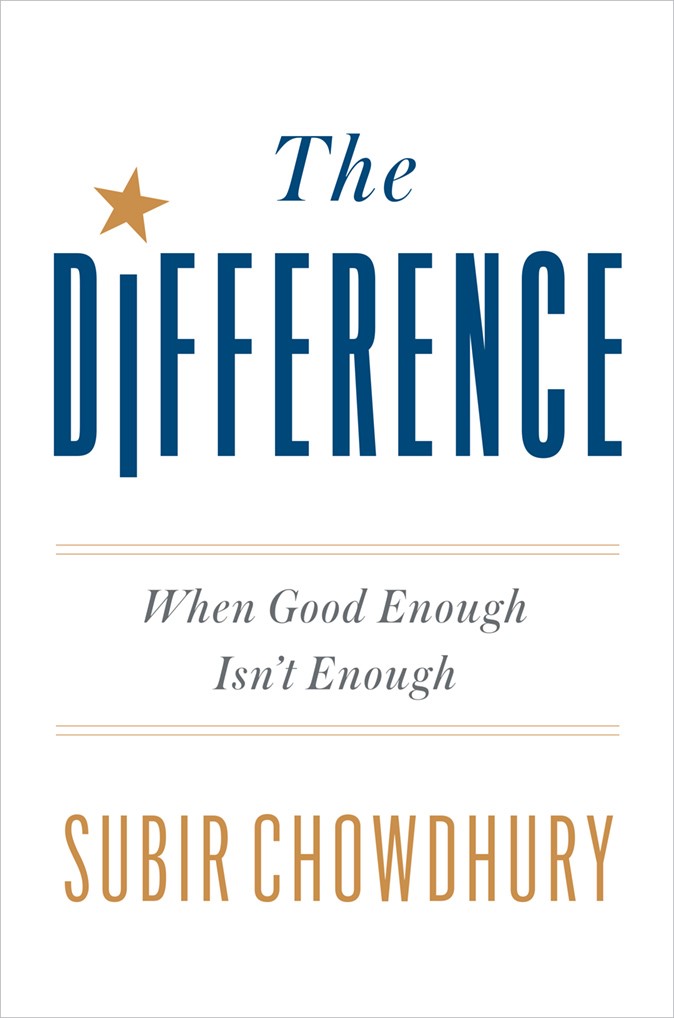
In general, I don’t like books on personnel management. ?That’s mostly because good management techniques are mostly obvious, and there are typically a lot of good strategies that are somewhat different, and most of them will work, if applied with a little common sense. ?Pick one. ?Apply it. ?Be consistent. ?Get feedback. ?Adjust. ?Repeat.
No one has the “holy grail.” ?That is true of this book also. ?What I appreciate about “The Difference” is its emphasis on creating a good culture. ?I’ve worked in companies with good cultures, bad cultures and mixed cultures. ?What?Subir?Chowdhury gets right is the key difference is attitude, and it flows from the top.
Some?firms fail because employees are afraid to tell the truth. ?That was true within areas of AIG when I worked for it. ?Do you want?a culture based on truth? ?Be honest, ask for it from your bosses, and expect it from your subordinates. ?Don’t punish anyone for telling the truth; instead reward it.
Some firms fail because of a lack of emphasis on quality. ?The need for short-term profits outweighs quality products and services. ?Low quality is a cancer — it can spread from employee relationships to products, services, accounting, vendor relations, marketing, etc. ?Cultural change is needed, starting at the top. ?If management doesn’t put quality ahead of short term profits, quality will not characterize a company. ?Management has to lead efforts on quality by example, instructions, and rewards. ?Employees won’t care about quality if management doesn’t care about them, and reward them for stopping bad quality even if it slows production.
The book takes an approach like this, only much better than I can. ?It provides a cutesy acronym to summarize the approach for creating a great corporate culture, which to me trivializes ideas, but aids memory for others.
The author peppers the book with his experiences in his life ?and work, from youth to the present. ?I found those to be a mixed bag. ?Like most people, a lot of it sounds like he is tooting his own horn repeatedly. ?Many of them are quite instructive, a few aren’t. ?I particularly found his example of giving to beggars to be weak. ?Yes, the poorest need money, but what they need more is relationships. ?The poorest lose relationships due to disease, accidents, substance abuse, selfishness on the part of their family and their own selfishness, an attitude of blaming the world around rather than look at their own failures, and more.
Giving them money does not break the problem; it often feeds the problem. ?Creating relationships for them can allow them to reboot their lives, if they want to live a new life. ?Don’t get me wrong; I’m no great shakes here. ?I just know that the poorest need radical personal change if they ever want to escape their poverty. ?Money won’t make the difference necessary most of the time.
That last rant aside, I liked the book and would recommend it. ?It’s kind of expensive for its size, but maybe you want a short book that you can read in 1-2 hours. ?You’ll get enough to make you think, and maybe make a difference. ?It’s “good enough” to help you, but not outstanding.
Quibbles
Already mentioned.
Summary / Who Would Benefit from this Book
You may not need another management book. ?If you need something short to motivate a need for corporate and personal change, this could be the book for you.? If you want to buy it, you can buy it here: The Difference: When Good Enough Isn’t Enough.
Full disclosure:?The publisher asked me if I wanted a free copy and I assented.
If you enter Amazon through my site, and you buy anything, including books, I get a small commission. This is my main source of blog revenue. I prefer this to a ?tip jar? because I want you to get something you want, rather than merely giving me a tip. Book reviews take time, particularly with the reading, which most book reviewers don?t do in full, and I typically do. (When I don?t, I mention that I scanned the book. Also, I never use the data that the PR flacks send out.)
Most people buying at Amazon do not enter via a referring website. Thus Amazon builds an extra 1-3% into the prices to all buyers to compensate for the commissions given to the minority that come through referring sites. Whether you buy at Amazon directly or enter via my site, your prices don?t change.

“…Be honest, ask for it from your bosses …” My experience is that culture flows down, not up, through self- selection effects. Specifically, if the boss is corrupt, the honest employees will go elsewhere while the corrupt ones will stay.
Nick de Peyster
http://undervaluedstocks.info/